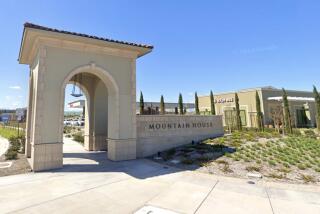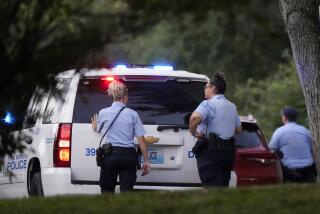Once a Speed Trap, Town Is Counting Down
- Share via
MACKS CREEK, Mo. — Folks in this small central Missouri community are scratching their heads over a vote to dissolve the city that has tried for years to shake its reputation as nothing more than a speed trap.
Over a cup of coffee and before the lunch rush hit at the Creekside Cafe, cook Helen Eidson speculated that many voters didn’t understand what they were choosing. She said her family opened one of the first stores in Macks Creek, and she didn’t want to see the 132-year-old city fade away, although today she lived outside the city limits.
But with low attendance at city meetings and an open spot on the board of aldermen for more than a year, the city’s attorney decided to see how much interest residents had in keeping the community together. He brought two proposals to a meeting last year -- one to rename the city Baghdad and another to start the process to disincorporate. “[I] wanted to find out if there was actual true feeling and desire for the disincorporation issue to be pursued further,” attorney Mel Gilbert said.
The Baghdad proposal, he said, came out of frustration that the United States is spending millions of dollars on water and sewer systems in Iraq when small towns across America struggle for the same thing.
The ideas sparked interest -- the meeting was crowded, for a change -- and people were furious about renaming the city. That proposal failed, but the disincorporation measure went on the Nov. 2 ballot, and residents voted 64-55 to circulate a petition to disincorporate. If the petition gets enough signatures -- half the city’s 184 registered voters need to sign -- the measure would go on the ballot, possibly in April.
Those who have heard of the city -- with an official population of 267 -- may associate it with an infamous speed trap police operated in the 1990s. Macks Creek is in a valley along U.S. 54 near the tourist-heavy Lake of the Ozarks. For years, motorists were forced to slow from as much as 65 mph to 45 mph, and police ticketed those who didn’t.
B.J. Carnahan, who lives outside the city limits, said for years he helped pay for signs warning of the speed trap. “People wouldn’t travel here. They were afraid to come through this town. They won’t live this reputation down for lots of years. It devastated the community.”
Today, the community is quiet, with farmland dotted by homes, a school and a handful of open businesses along its main street. There is no grocery store, but a few doors down the street from the cafe is the post office, City Hall and senior center, next to a vacant building still marked Police Department.
For awhile, the city survived on speeding ticket revenues. In 1994, three-fourths of the revenue came from municipal court fines. It got to the point that the state Legislature passed a law in 1995 limiting how much revenue a city could earn from tickets and requiring anything beyond that to be turned over to the state.
“It was absolutely an abuse. They would stop people for any kind of thing,” said state Sen. Delbert Scott, who pushed for the law. He said he was pulled over in Macks Creek, although he got off without a ticket, for his tires touching the white line on the road’s edge. But he said he worked to stop the speed trap for years before that and didn’t target Macks Creek out of spite.
Shortly after the law passed, the state audited the city books and found that Macks Creek, which in years past had taken in hundreds of thousands of dollars from parking tickets alone, had only a few thousand dollars in the bank and a bill from the state for at least $66,000. The city disbanded the police force and filed for bankruptcy. At one point, its debt was $186,000. Officials said the debt was now less than $20,000.
Von West, a former alderman who sought the state audit, is among those unsure whether the city should continue. “I don’t see no future for it myself,” he said. “I don’t think it’ll ever build back.”
More to Read
Get the L.A. Times Politics newsletter
Deeply reported insights into legislation, politics and policy from Sacramento, Washington and beyond. In your inbox twice per week.
You may occasionally receive promotional content from the Los Angeles Times.







